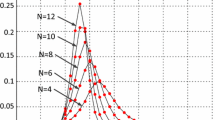Abstract
Both the underlying model strength and biases are two crucial factors for successful integer GNSS ambiguity resolution (AR) in real applications. In some cases, the biases can be adequately parameterized and an unbiased model can be formulated. However, such parameterization will, as trade-off, reduce the model strength as compared to the model in which the biases are ignored. The AR performance with the biased model may therefore be better than with the unbiased model, if the biases are sufficiently small. This would allow for faster AR using the biased model, after which the unbiased model can be used to estimate the remaining unknown parameters. We assess the bias-affected AR performance in the presence of tropospheric and ionospheric biases and compare it with the unbiased case. As a result, the maximum allowable biases are identified for different situations where CORS, static and kinematic baseline models are considered with different model settings. Depending on the size of the maximum allowable bias, a user may decide to use the biased model for AR or to use the unbiased model both for AR and estimating the other unknown parameters.








Similar content being viewed by others
References
Allison T (1991) Multi-observable processing techniques for precise relative positioning. In ION GPS-91, Albuquerque, NM, pp 715–726
Dach R, Hugentobler U, Fridez P, Meindl M (2007) Bernese GPS software version 5.0. Astronomical Institute, University of Bern
de Jonge PJ, Tiberius CCJM (1996) The LAMBDA method for integer ambiguity estimation: implementation aspects, LGR-series, No. 12. Technical report, Delft University of Technology
de Jonge PJ, Teunissen PJG, Jonkman N, Joosten P (2000) The distributional dependence of the range on triple frequency GPS ambiguity resolution. In ION-NTM 2000, Anaheim, CA, pp 605–612
Feng Y (2008) GNSS three carrier ambiguity resolution using ionosphere-reduced virtual signals. J Geodesy 82:847–862
Goad CC (1992) Robust techniques for determining GPS phase ambiguities. In 6th Geodesy Symposium on Satellite Positioning, Columbus, Ohio, pp 245–254
Hatch R (1982) The synergism of GPS code and carrier measurements. In 3rd Int Geod Sympon Satellite Doppler Positioning, 2:1213–1231, Las Vegas, New Mexico
Hatch R, Jung J, Enge P, Pervan B (2000) Civilian GPS: the benefits of three frequencies. GPS Solut 3(4):1–9
Henkel P, Günther C (2010) Partial integer decorrelation: optimum trade-off between variance reduction and bias amplification. J Geodesy 84:51–63
Joosten P, Irsigler M (2003). GNSS ambiguity resolution in the presence of multipath. In the European navigation conference GNSS 2002, Graz, Austria
Joosten P, Teunissen PJG (2001) On the error sensitivity of the GPS ambiguity success rate. In KIS 2001, pp 409–414, Banff, Canada
Kubo N, Yasuda A (2003) How multipath error influences on ambiguity resolution. In Proceedings of ION GNSS 2003, Portland
Leick A (2004) GPS satellite surveying, 3rd edn. Wiley, New York
Li B, Teunissen PJG (2011) High dimensional integer ambiguity resolution: a first comparison between LAMBDA and Bernese. J Navig 64(S1):S192–S210
Li B, Feng Y, Shen Y (2010a) Three carrier ambiguity resolution: distance-independent performance demonstrated using semi-generated triple frequency GPS signals. GPS Solut 14(2):177–184
Li B, Shen Y, Feng Y (2010b) Fast GNSS ambiguity resolution as an ill-posed problem. J Geodesy 84(11):683–698
Li B, Feng Y, Shen Y, Wang C (2010c) Geometry-specified troposphere decorrelation for subcentimeter real-time Kinematic solutions over long baselines. J Geophys Res, 115(B11):B11404. doi:10.1029/2010JB007549
Liu GC, Lachapelle G (2002) Ionosphere weighted GPS cycle ambiguity resolution. In ION National Technical Meeting, San Diego, CA, pp 1–5
Nardo A, Huisman L, Teunissen PJG (2011) GPS+GLONASS CORS processing: the Asian-Pacific APREF case. In IUGG 2011, Melbourne, Australia
Odijk D (2000) Weighting ionospheric corrections to improve fast GPS positioning over medium distances. In ION GPS 2000, Salt Lake City, UT, pp 1113–1123
Odijk D (2002) Fast precise GPS positioning in the presence of ionospheric delays. Ph.D. thesis, Publications on Geodesy, 52, Netherlands Geodetic Commission, Delft
Schaffrin B, Bock Y (1988) A unified scheme for processing GPS dual-band phase observations. Bull Geodesique 62:142–160
Teunissen PJG (1993) Least squares estimation of the integer GPS ambiguities. In Invited lecture, section IV theory and methodology, IAG General Meeting, Beijing
Teunissen PJG (1995) The least-squares ambiguity decorrelation adjustment: a method for fast GPS integer ambiguity estimation. J Geodesy 70:65–82
Teunissen PJG (1999) An optimality property of the integer least-squares estimator. J Geodesy 73(11):587–593
Teunissen PJG (2001) Integer estimation in the presence of biases. J Geodesy 75:399–407
Teunissen PJG, Joosten P, Tiberius CCJM (2000) Bias robustness of GPS ambiguity resolution. In ION GPS 2000, Salt Lake City, pp 104–112
Teunissen PJG, Joosten P, Tiberius CCTM (2002) A comparison of TCAR, CIR and LAMBDA GNSS ambiguity resolution. In ION GPS 2002, Portland, OR, pp 2799–2808
Verhagen S, Joosten P (2003) Algorithms for design computations for integrated GPS—Galileo. In the European navigation conference GNSS 2003, Graz, Austria
Verhagen S, Li B (2012) LAMBDA software package: Matlab implementation, version 3.0. Delft University of Technology and Curtin University, Perth, Australia
Verhagen S, Odijk D, Boon F, López-Almansa J (2007) Reliable multi-carrier ambiguity resolution in the presence of multipath. In ION GNSS 2007, pp 339–350, Forth Worth, TX
Verhagen S, Li B, Teunissen PJG (2013) Ps-LAMBDA: ambiguity success rate evaluation software for interferometric applications. Comput Geosci 54:361–376
Vollath U, Birnbach S, Landau H, Fraile-Ordoñez JM, Martín-Neira M (1998) Analysis of three-carrier ambiguity resolution (TCAR) technique for precise relative positioning in GNSS-2. In ION GPS-98, Nashville, TN, pp 417–426
Acknowledgments
This work has been executed in the framework of the Positioning Program Project 1.01 “New carrier phase processing strategies for achieving precise and reliable multi-satellite, multi-frequency GNSS/RNSS positioning” in Australia of the Cooperative Research Centre for Spatial Information. PJG Teunissen is the recipient of an Australian Research Council (ARC) Federation Fellowship (project number FF0883188). This support is gratefully acknowledged.
Author information
Authors and Affiliations
Corresponding author
Rights and permissions
About this article
Cite this article
Li, B., Verhagen, S. & Teunissen, P.J.G. Robustness of GNSS integer ambiguity resolution in the presence of atmospheric biases. GPS Solut 18, 283–296 (2014). https://doi.org/10.1007/s10291-013-0329-5
Received:
Accepted:
Published:
Issue Date:
DOI: https://doi.org/10.1007/s10291-013-0329-5




